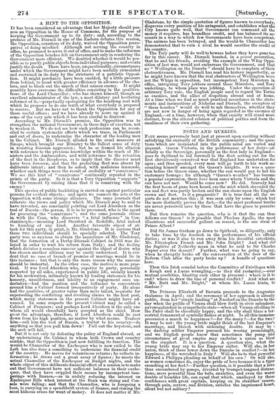NOTES AND QITE.RTES.
FATE seems perversely bent just at present upon exciting without satisfying the curiosity of the British community ; and the ques- tions which are insinuated into the public mind are varied and piquant. Queen -Victoria, in the performance of her duty—of- ficially as the Sovereign, personally as the first lady in England— goes to Spithead to bid farewell to the fleet setting out for the first chivalrously-conceived war that England has undertaken for ages; and thus speeded, every man will go forth to his work ac- counting himself amongst the Queen's knights. It was a ques- tion before the Queen came, whether the sun would pay to her his customary homage ; for although "Queen's weather" has become a popular expression, there have been cases where Victoria and the sun have not met. Would he come now ? He did. Scarcely had the first boom of guns been heard, ere the mist which shrouded the sea and fleet was partly broken and the sun shone upon the English crown and fleet. Is it a prognostic ? It is true that all the re- ports do not mention this ; it was seen only by some ; which but the more distinctly proves the fact,—for the most profound truths are never perceived save by those that have the grace to perceive them.
But then remains the question, why is it that the sun thus follows our Queen ? is it possible that Phoebus Apollo, the most illustrious and successful gallant on record, is the one rival of Prince Albert ?
Did Sir James Graham go down to Spithead, so diligently, only to take time by the forelock in the performance of his official duties ; or was it also to run away from his dreadful catechists, Mr. Fitzstephen French and Mr. John Bright ? And what did the fugitive of Netherby mean in what be said to Sir Charles Napier over the dessert? Further, what was he going to say, when he abruptly broke off the conversation at the door of the Reform Club after the party broke up ? A bundle of questions here.
Then this Irish scandal before the Committee of Privileges with a Keogh and a Lucas wrangling,—'as they did yesterday,—over mutual acerbities, blasting each other in presence : where is it to end? where to draw the line of personal conflict? And what are " Mr. Butt and Mr. Bright," at whom Mr. Lucas hints, to disclose ?
The Princess Elizabeth of Bavaria proceeds to the Augustan thalamus in April ; and the ceremony of her approach is already public, from her "simple landing " at Nnsdorf on the Danube to the day when the guilds of Vienna shall blow forth in civic splendour, pavoneggiandosi in sympathetic state—when all Vienna strolling in the Pater shall be cheerfully happy, and the city shall blaze a ter- restrial firmament of symbolic flames at night. Is all this immense procession a march to happiness ?—for the many ?—for the two ? It may be not : the young bride might think of the last Emperor's marmage, and blanch with sickening doubts. It may be : I the dashing soldier Emperor pursued his wooing promisingly, and we English people know that sometimes the pomp and circumstance of great empire may enshrine a union as blest as the simplest. It is a question. A question also, what the young bride may say to her Emperor suitor. Will she, in her union, think of those lower down the Danube in conflict?—in her happiness, of the wretched in Italy ? Will she be to that powerful Edward a Philippa pleading on behalf of his own ! Or will she, as women sometimes do, enjoy the pride of love because it is a tiger crouching at her feet ?—Further question, is it possible that a love thus encumbered by pomps, diverted by trumpet-tongued distrac- tions, more powerful than the toils, anxieties, and even the worst doubts of humbler life, can equal that which, unalloyed by these confidences with great capitals, keeping on its steadfast course, through pain, sorrow, and-division, satisfies the imprisoned heart, silent but not solitary P


























 Previous page
Previous page